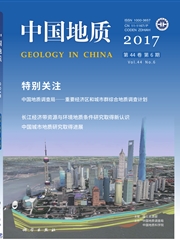

 中文摘要:
中文摘要:
雅满苏铁矿床位于东天山中段,矿体赋存于下石炭统雅满苏组安山质火山碎屑岩中,受近EW向断裂及环形断裂构造控制。矿体主要呈层状、似层状、透镜状,近矿围岩蚀变强烈,形成石榴石矽卡岩及复杂矽卡岩。电子探针分析结果表明,石榴石为钙铁榴石-钙铝榴石系列,其化学组成可表示为And45.68-100Gro0.67-57.95(A1m+Sps)11-29.03,与典型的矽卡岩型铁矿中石榴石端员组分相似。在磁铁矿Ca+Al+Mn-Ti+V图解中,大部分样品落入矽卡岩型铁矿区;TiO2-Al2O3-MgO图解中,大多数的样品落入沉积变质接触交代磁铁矿趋势区,部分早期磁铁矿落在岩浆趋势区内。结合矿床地质特征和矿物学研究,认为大多数样品经过了一个热液交代作用过程,表明雅满苏铁矿的形成与岩浆热液交代作用有关。
 英文摘要:
英文摘要:
Located in the middle of Eastern Tianshan Mountains, the large-size Yamansu iron deposit is hosted in Andesitic volcanic clastic rock or andesitic tuff of the Lower Carboniferous Yamansu Formation, with a lenticular marble beneath the main ore body. The ore bodies occur as lamellar stratoids and lenses, controlled by EW-striking faults and circular faults. Wall rock alteration is strong, including garnet skarn and complex skarn. Electeon microprobe analyses show that the end member of garnet is andradite (And) with an average content of 63.59%, grossularite(Gro) with an average content of 34.11%, almandite(Alm) and spessartine (Sps) with an average content of 4.44%. Components of garnet and pyroxene are And45.68-100Gro0.67-57.95(A1m + SpS)11-29.03, which indicates that characteristics of this skarn minerals are quite similar to those in calcic skarn from the major large iron deposits, suggesting that they probably resulted from skarnization; In the Ca + Al + Mn versus Ti + V discriminant diagram showing spot analyses of magnetite and hematite, almost all data from the Yamansu ore deposit fall into the region of the skarn type iron deposit. In addition, in the ternary plot of TiO2-Al2O3-MgO of magnetite, many data from the Yamansu ore deposit tend to be seated in the sedimentary metamorphogenic and contact meatasomatic region while less data drop into magmatic mafic-ultramafic region. These two diagrams may suggest that the formation mechanism of magnetite from this ore deposit may be Similar to that of magnetite from skarn iron deposits. Combining the geological characteristics with the study of mineralogy, the authors hold that most samples through a process of hydrothermal metasomatism, it indicates that iron formation was related to magmatic hydrothermal metasomatism.
 同期刊论文项目
同期刊论文项目
 同项目期刊论文
同项目期刊论文
 期刊信息
期刊信息
